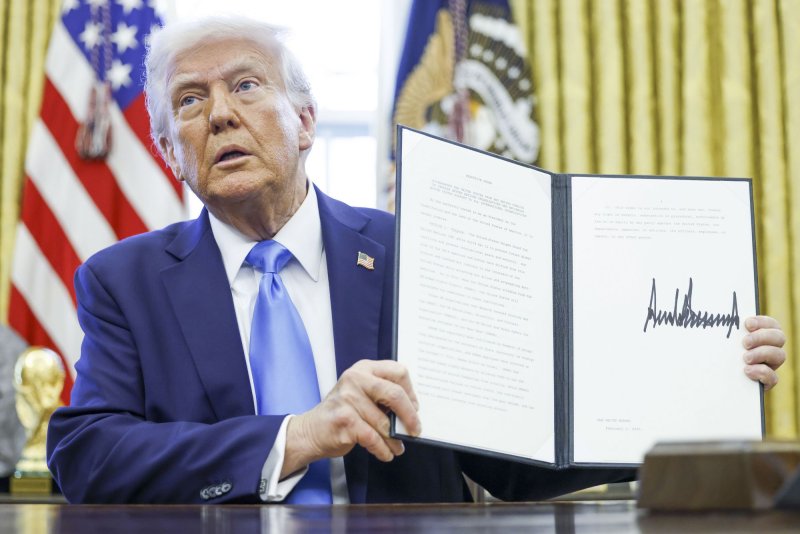Feb. 4 (UPI) — President Donald Trump on Tuesday signed a memorandum to restore the so-called maximum pressure campaign on Iran from his first administration, which failed to achieve its goal of bringing about a new deal with Tehran to prevent it from securing a nuclear weapon. Instead, the Middle Eastern country has escalated its nuclear weapons program.
Trump signed the National Security Presidential Memorandum at the White House prior to his meeting with Prime Minister Benjamin Netanyahu of Israel.
The memorandum states that the campaign consists of the departments of Treasury and State applying sanctions on Iran, the Department of Justice investigating financial and logistical networks tied to Iran and Iran-proxy groups and the U.S. Permanent Representative to the United Nations seeking to reinstate international sanctions and restrictions on Iran.
Trump had launched this maximum pressure campaign on Iran in 2018 after he imposed sanctions on Iran and withdrew the United States from a landmark President Barack Obama-era multinational nuclear accord aimed at preventing Tehran from gaining an atomic bomb.
Calling the Joint Comprehensive Plan of Action “defective at its core,” Trump sought to use sanctions to force Iran back to the negotiating table to secure a deal he felt was better, but that never materialized.
European partners attempted to maintain the Joint Comprehensive Plan of Action, not agreeing with Trump’s unilateral move. Iran repeatedly violated its commitments under the deal before ceasing its implementation altogether in early 2021.
Amid the growing tensions between the two countries, the administration of President Joe Biden attempted to restart the JCPOA negotiations with Iran, but any remaining prospects effectively ended after Iran-backed Hamas attacked Israel in October of 2023.
According to the U.S. Congressional Research Service, last year, Iranian officials, in an unprecedented move, opened its nuclear weapons program.
The JCPOA will not expire until October.
The Institute for the Study of War said within hours of Trump signing the memorandum that “Iran is conducting nuclear research that would enable it to build a nuclear weapon in a period of months,” though the organization “does not assess that Iran has decided to build” such a weapon at this time.
Many analysts — as well as the Biden administration — maintain the maximum pressure plan failed and had the adverse effect intended. It also saw Tehran forge closer relations with Russia, whom it has been accused of aiding in its war against Ukraine, and North Korea.
Prior to signing the memorandum on Tuesday, Trump told reporters in the Oval Office he was reluctant to do so, stating it’s “very tough on Iran.”
“I’m going to sign it, but hopefully we’re not going to have to use it very much. We will see whether or not we can arrange, we’ll work out a deal with Iran and everybody can live together and maybe that’s possible and maybe it’s not possible, so I’m I’m signing this and I’m unhappy to do it, but I really have not so much choice,” he said.
Asked what kind of deal he is seeking from Iran, he replied with the long-held U.S. stance that Iran will be prevented from securing nuclear weapons.
“We don’t want to be tough on Iran — we don’t want to be tough on anybody — but they just can’t have a nuclear weapon,” he said.
Despite the criticism of his maximum pressure campaign from his first administration, there are supporters among his Republican Party and anti-Tehran regime activists.
“The president is telegraphing to Tehran that while it has been trying to lure him into immediate negotiations, the president is rightfully starting to build out a pressure architecture that will leave a line open for coercive diplomacy,” Jason Brodsky, policy director at the non government United Against Nuclear Iran policy organization, said on X.
“This will come as a cold shower for the Islamic Republic’s foreign minister and others who have been clinging to the false hope that the president is not the same president of his first term on Iran policy.”
